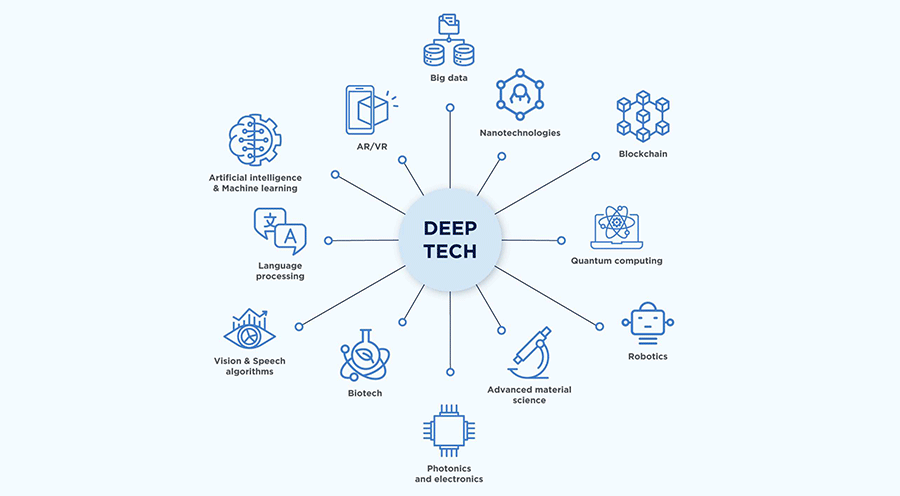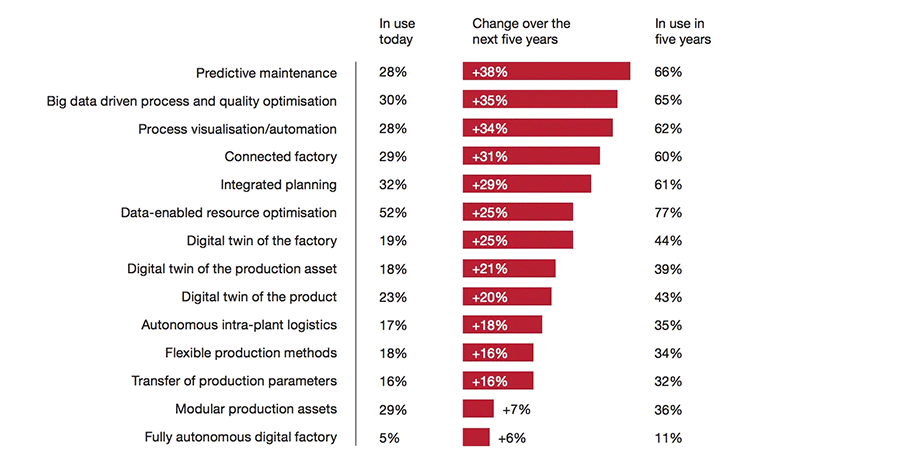RIL AGM 2024 – Evolution into a DeepTech Manufacturing Powerhouse
September 10, 2024
|
In 2022, Reliance Industries Chairman Mr. Mukesh Ambani stated that Reliance will double its market value by 2027. What gives him the confidence to say this? We discuss below the key highlights from the AGM and our take on the same.
The chairman’s statement at the AGM was titled, “Transforming Reliance into a Deep-Tech Company with Advance Manufacturing.”
So, what is DeepTech?

So, in simple terms, DeepTech is the use of advanced technologies to leverage, optimize, rationalize, and improve business processes. In some sectors, deeptech has changed how businesses operate by disrupting the conventional ways of operating in that sector, thus fostering continuous innovation and development. In short, these are the next-gen ways of doing business.
This term is heard a lot more in the startup and PE-VC Eco System. However, Reliance, known for its DNA to disrupt and conquer, has yet another industry to take by storm.
We must recognize the magnanimity of this initiative. Adopting such technologies will not only enable Reliance to become even more competitive on a global scale but will also allow it to grow its already large businesses into even larger entities that dominate the market. On top of it, it has invested in emerging areas of green energy, which are expected to grow exponentially in the next 5-7 years.

In the address, Mr. Mukesh Ambani stresses on the 3 primary methods through which Reliance will achieve this:
- Embedding innovative technologies in every single business.
- In-house technological innovations to enhance the product and service offerings.
- Built an AI-native digital infrastructure for all Reliance businesses. Building a proprietary software stack, integration of end-to-end workflows, and real-time dashboards.
AI & Advanced Technology Initiatives by Reliance
Patents: Reliance has filed patents in 6G, 5G, AI-Large Language Models, AI-Deep Learning, Big Data, Devices, Internet of Things, and Narrowband-IoT. RIL has >350 patents in 5G and 6G alone. This will enable it to compete on a global stage.
Fully homegrown 5G-Stack: Jio is practically the only Indian company to have indigenized its own 5G ecosystem, right from 5G cells, spectrum, tower infrastructure, and 5G equipment. This puts Jio decades ahead of anyone even thinking of competing with Jio in the telecom space.
AI for everyone vision: To do this, Reliance is taking a different route from that taken by global mobile device hardware companies, which are focusing on keeping AI processing within the device (e.g. Apple and Samsung offering smartphones with built-in smart AI chips). Reliance on the other hand is building a delivery model where AI services and processing will be hosted on the cloud over low latency broadband networks. What this will do is enable Reliance to provide AI services to the lowest spectrum of smartphone users (the budget phones <₹10,000), versus compared to what is currently the luxury of only high-end smartphones (>₹60,000).
Advantage Reliance in AI:
- Plans to establish gigawatt-scale AI-ready data centres in Jamnagar, powered entirely by Reliance's green energy. This could be a differentiating factor for Reliance, as it will meet the energy needs for its data centres from its captive renewable facilities.
- Reliance will need integration with the cloud to offer such a holistic kind of cloud-based service to its customers. This might not be difficult for Reliance, as it has partnered with Google, Qualcomm, and Meta; all three of them having equity stakes in Jio. On top of it, it will have its own data centre capabilities as well.
Reiterating the revolutionary DNA of Reliance, the chairman Mr. Mukesh Ambani announced that all Jio users will get 100GB of free cloud storage. This is significantly higher compared to Google, which offers up to 15GB of free cloud storage, and Microsoft, which offers only 5GB.
The chairman discussed the applications of AI across areas like agriculture, education, healthcare, small businesses, entertainment, and retail businesses.
The advent of ML in manufacturing
Within the overall AI industry, machine learning is gaining increasing prominence as an emerging technology. The chart below illustrates the applications of ML in various aspects of the manufacturing process:

Other applications include energy consumption forecasting, generative design, and supply chain management using predictive demand & supply forecasting models.
Reliance to achieve dominance of the likes of Amazon, Apple and Meta
With all the above initiatives, Reliance will redefine itself as a Technology company that uses advanced manufacturing.
This will put Reliance in the ranks of global giants like Amazon, Apple, Berkshire Hathaway, Alphabet Inc, Microsoft, and Meta, both in terms of technological prowess. Today, Reliance is bigger than established conglomerates in the US, like Danaher, Honeywell, and General Electric in US $ terms.
With access to user data of approximately 40% of the Indian population through Jio, and also through the user base of Reliance retail, Reliance has access to valuable data which can be used to make important business decisions. Add on top of that the use of AI & ML that continuously learn from the data, and we have insights on the average Indian consumer that few Indian or foreign companies have.
The use of models and quantitative data for business decision-making is highly underrated. Adoption of deep tech will give Reliance the kind of business insights that a human mind might miss. For example, any manufacturing company wants to know the SKUs that will be needed at the wholesaler/retailer level in the month of October 2024, even before the customers come in and buy. This is needed so that the required stock gets delivered in time before the customers come in to buy the same. This frees up working capital that can allocated elsewhere. Such a capability gives any business a competitive advantage which is very difficult to replicate.
We also discuss the key updates from all the business segments of RIL:
Key Updates Across RIL’s Segments
Jio: Dominates the Indian mobile market with 49 crore customers and impressive growth in 5G adoption. Revenue crossed ₹1 trillion with a 50% EBITDA margin.
Home Services/Broadband: Rapid growth with innovations like JioHome App and JioTV+ enhancing connectivity.
Media & Entertainment: The media and entertainment segment saw significant growth with a 49% YoY increase, driven by Viacom18 and JioCinema.
Reliance Retail
- With a gigantic, pan-India store network of 19,000 stores, Reliance Retail generated ~₹3 trillion in revenues, growing 17.8% YoY. EBITDA margins stood at 8.5% (+70bps YoY). Reliance Retail has ~30 crore customers and has added 1840 stores during the year (i.e. ~153 stores per day, assuming no holidays were taken!).
- Food & Grocery: expanding our premium formats, Fresh Signature and Freshpik, in large cities. Other initiatives: JioMart, Metro Cash and Carry, 7-Elevens.
- Fashion: Diverse portfolios mix of own brands and third-party brands. Own brands like Netplay and DNMX reported impressive performance. The digital app, Ajio continues to lead in the mobile app e-commerce business.
- Consumer electronics: Reliance continues to be the market leader in consumer electronics retail. Focus on expanding the big-box Reliance Digital formats, while optimizing the formats for stores focusing on mobiles and laptops.
- Jewels Business: i) expanding our design capabilities, ii) plans to enter the luxury jewellery segment with a curated, design-led experience and explore the fashion jewellery and accessories segment to broaden our market reach.
- Beauty and Personal Care: Expanding product portfolio with a mix of home-grown brand acquisitions.
Oil & Gas Exploration & Production
- Fields in the KG Basin have reached peak output levels this year. Currently, production from the KG D6 fields is nearly 30 MMSCMD of gas and 22,000 barrels per day of condensate.
- Reliance’s fields now contribute nearly 30% of India's domestic gas production.
- Jio- BP partnership: ~4800 EV charge points across the country.
O2C business
- This segment generated revenues of ₹5.64 trillion, with an EBITDA of ~62,000cr (~11% EBITDA margin).
- The above performance was delivered in a year when freight costs spiked significantly due to geopolitical conflicts. RIL ensured:
- Manufacturing assets operated at optimum capacity and gave higher throughput
- By chartering more vessels on a long-term basis, RIL was able to mitigate the impact of elevated freight costs globally.
- Stronger demand for Petrochem products in the domestic market, enabled higher sales in the market.
- Using deep tech initiatives to optimize manufacturing processes.
- RIL initiated massive capex in the O2C segment this year:
- Added capacity of Ethylene Oxide in the Chemicals segment. (45k tonnes)
- New facility for PVC and CPVC (+1.5mn tonnes/annum) by FY27
- Speciality polyester (+1mn tonnes/annum) by FY27
- Carbon fibre plant for the infrastructure sector at Hazira
- Adding 3 Very Large Ethane carriers (VLECs) to the existing fleet of 6 for sourcing ethane from North America.
New Energy
Ongoing Capex initiatives:
- On track to set up the first phase of our integrated solar production facilities. This includes modules, cells, glass, wafer, ingot, and polysilicon, with an initial annual capacity of 10 GW. Looking to commercialize the products within two years post capacity building completion. The pilot has already been successful.
- Started construction of 30GWh of advanced chemistry-based battery manufacturing facility at Jamnagar. Production to start in H2 of FY25.
- Fully automated, multi-GW electrolyser manufacturing facility on the west coast of India, which will be ready by 2026.
Looking Ahead
Chairman Mukesh Ambani envisions that Reliance’s New Energy sector could soon match the earnings of its O2C business, setting the stage for a remarkable growth trajectory.
Reliance’s journey into Deep Tech and advanced manufacturing is not just a bold statement; it's a strategic evolution positioning the company at the forefront of global innovation.











